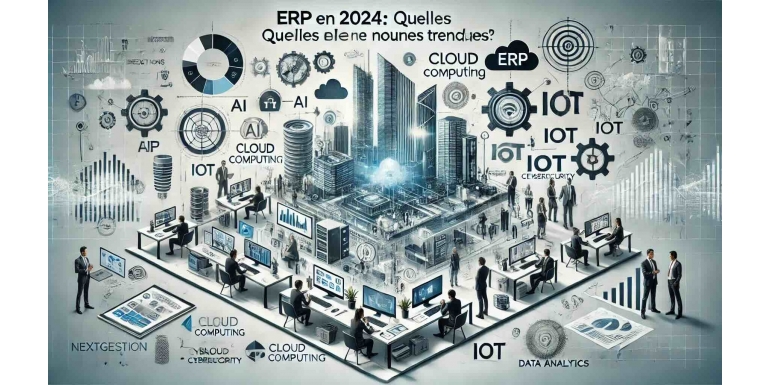
ERP in 2024: What Are the New Trends?
The year 2024 marks a significant milestone in the evolution of Enterprise Resource Planning (ERP) systems. Companies of all sizes increasingly recognize the need to adopt cutting-edge technologies to stay competitive. But what are the new ERP trends for 2024? This article explores in detail the key innovations shaping the future of ERP, emerging features, and how these trends can transform your business.
1. The Rise of Artificial Intelligence (AI) and Machine Learning
AI and machine learning are at the heart of many ERP innovations in 2024. These technologies enable ERP systems to automate complex tasks, improve decision-making, and offer more accurate forecasts. Key applications of AI in ERP include:
- Process Automation: Reducing repetitive tasks through AI, allowing employees to focus on higher-value activities.
- Predictive Analytics: Using machine learning to analyze historical data and predict future trends, helping to anticipate needs and optimize the supply chain.
- Enhanced Customer Experience: Personalizing customer interactions based on past behavior through AI.
2. Cloud ERP: More Than Just a Trend
Cloud adoption continues to grow in 2024, and ERPs are no exception. More and more companies are turning to cloud-based ERP solutions to benefit from flexibility, scalability, and cost reduction. Key advantages include:
- Real-Time Accessibility: Access to data and business processes from anywhere, which is essential in an increasingly connected and mobile world.
- Automatic Updates: Cloud ERPs are constantly updated by the provider, ensuring access to the latest features without disrupting business operations.
- Enhanced Security: Cloud service providers invest heavily in security, offering robust protection against cyber threats.
3. Customization and Modularity
In 2024, businesses demand ERP solutions that are not only powerful but also flexible. Customization and modularity are thus becoming essential criteria. Modern ERPs offer:
- Industry-Specific Modules: Companies can choose modules tailored to their industry, whether in manufacturing, retail, healthcare, or finance.
- Deep Customization: Businesses can tailor the user interface, workflows, and reports to their specific needs.
- Integration with Other Software: ERPs are increasingly designed to integrate easily with other business software tools, such as CRM, accounting software, or supply chain management systems.
4. Integration of the Internet of Things (IoT)
The Internet of Things (IoT) is another major trend in 2024, with significant implications for ERPs. Integrating IoT into ERP systems allows companies to:
- Real-Time Data Collection: IoT sensors can provide real-time data on machines, inventory, and operations, enabling more proactive management.
- Predictive Maintenance: With IoT, companies can anticipate equipment failures before they occur, reducing downtime.
- Supply Chain Optimization: IoT allows tracking of products throughout the supply chain, ensuring better visibility and optimization of logistics processes.
5. Cybersecurity at the Core of Concerns
With the increase in cyberattacks, data security has become a priority for companies using ERP systems. In 2024, ERP solutions incorporate advanced security features to protect sensitive data. These features include:
- Data Encryption: All sensitive information is encrypted, both at rest and in transit.
- Granular Access Controls: Users can only access the information they need based on their role within the company.
- Continuous Monitoring: Modern ERP systems include real-time monitoring tools to detect and respond quickly to potential threats.
6. The Growing Importance of Integrated BI
Business Intelligence (BI) tools integrated into ERPs are becoming increasingly sophisticated in 2024. Companies are looking to leverage data to make more informed decisions and stay competitive. Modern ERPs offer:
- Real-Time Reporting: Instant access to key business data, enabling quick, fact-based decision-making.
- Customizable Dashboards: Users can create customized dashboards that highlight the most relevant performance indicators for their role.
- Predictive Analytics: The integration of BI with machine learning allows companies to predict future trends and make proactive decisions.
7. ERP for SMEs: More Accessible Solutions
Historically, ERPs have been perceived as solutions reserved for large enterprises due to their cost and complexity. In 2024, this perception is changing with the emergence of ERPs specifically designed for small and medium-sized enterprises (SMEs). These solutions offer:
- Flexible Pricing: Subscription and pay-as-you-go models that make ERP accessible to SMEs.
- Simplified Implementation: Fast and simplified implementation processes tailored to the limited resources of SMEs.
- Dedicated Support: Specialized customer support to help SMEs get the most out of their ERP solution.
Conclusion
The year 2024 is marked by significant advances in the field of ERP, with trends that are redefining how businesses manage their operations. The adoption of AI, cloud, IoT, and advanced security solutions is transforming ERPs into even more powerful and essential tools for business competitiveness. Whether you are a large company or an SME, these trends offer opportunities to optimize your processes, improve your responsiveness, and strengthen your security. Investing in a modern ERP tailored to your business in 2024 could be the key to maintaining and developing your competitive edge in a constantly evolving business environment.
